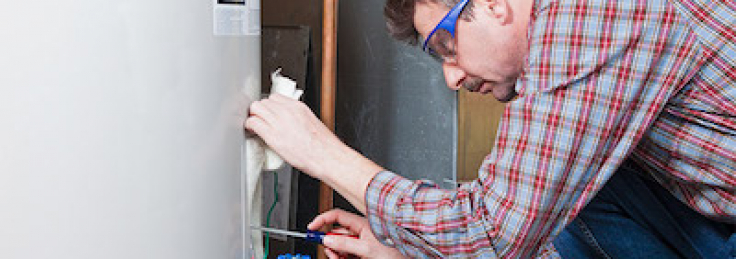A Step-By-Step Guide For Usual Water Heater Problems
A Step-By-Step Guide For Usual Water Heater Problems
Blog Article
What're your ideas about Common Problems with Your Home Water Heater?

Envision starting your day without your regular hot shower. That currently establishes a poor tone for the rest of your day.
Every house requires a reliable hot water heater, yet just a couple of know exactly how to handle one. One easy method to maintain your hot water heater in leading form is to look for mistakes routinely and fix them as soon as they appear.
Keep in mind to switch off your hot water heater prior to smelling about for mistakes. These are the hot water heater faults you are probably to experience.
Water too warm or also cold
Every hot water heater has a thermostat that establishes exactly how hot the water gets. If the water entering your residence is as well warm regardless of establishing a hassle-free optimum temperature level, your thermostat might be malfunctioning.
On the other hand, too cold water may be due to a stopped working thermostat, a damaged circuit, or inappropriate gas circulation. For example, if you make use of a gas water heater with a busted pilot light, you would certainly get cold water, even if the thermostat remains in perfect problem. For electric heating units, a blown fuse might be the offender.
Not enough hot water
Hot water heater can be found in many dimensions, relying on your hot water demands. If you lack warm water before everybody has actually had a bathroom, your hot water heater is also tiny for your family size. You should think about mounting a bigger hot water heater tank or choosing a tankless water heater, which uses up much less area as well as is extra resilient.
Unusual noises
There are at least five kinds of noises you can hear from a water heater, yet one of the most usual interpretation is that it's time for the hot water heater to retire.
First off, you need to recognize with the typical sounds a water heater makes. An electrical heating unit may sound various from a gas-powered one.
Popping or banging sounds typically mean there is a piece of sediment in your tanks, and also it's time to clean it out. On the other hand, whistling or hissing noises might simply be your valves allowing some pressure off.
Water leakages
Leaks can originate from pipes, water links, valves, or in the worst-case circumstance, the storage tank itself. Over time, water will wear away the storage tank, and also locate its way out. If this occurs, you require to replace your hot water heater as soon as possible.
Nevertheless, prior to your change your entire storage tank, make certain that all pipelines remain in area and that each valve works flawlessly. If you still require help identifying a leak, call your plumber.
Rust-colored water
Rust-colored water indicates among your hot water heater elements is rusted. Maybe the anode pole, or the container itself. Your plumber will certainly have the ability to recognize which it is.
Warm water
Despite just how high you established the thermostat, you will not obtain any kind of warm water out of a heater well past its prime. A water heater's efficiency might lower with time.
You will certainly likewise get lukewarm water if your pipelines have a cross link. This indicates that when you switch on a tap, warm water from the heater moves in together with regular, cold water. A cross link is very easy to area. If your warm water taps still run after closing the water heater valves, you have a cross link.
Discoloured Water
Rust is a major cause of filthy or discoloured water. Corrosion within the water container or a falling short anode pole might trigger this discolouration. The anode rod secures the tank from rusting on the inside and must be examined annual. Without a pole or an appropriately operating anode rod, the warm water promptly corrodes inside the storage tank. Call a professional water heater service technician to determine if replacing the anode rod will take care of the trouble; otherwise, change your hot water heater.
Verdict
Preferably, your hot water heater can last one decade prior to you need a modification. Nevertheless, after the 10-year mark, you might experience any one of these faults much more on a regular basis. At this point, you should add a brand-new hot water heater to your spending plan.
How To Troubleshoot 3 Common Water Heater Problems in Twin Cities
The Water Heater Is Leaking
A leaky cold water inlet valve A loose pipe fitting A leaky temperature and pressure relief valve A corroded anode rod A cracked tank Turn Off Your Water Heater:
Shut off your gas water heater by turning the gas valve on the unit to the “OFF” position. Shut off your electric water by switching its power off at your electrical panel. Look for a two-pole breaker labeled “water heater” and turn it to the “OFF” position. Move the ball valve connected to the water heater to be perpendicular to the piping at a 90° angle. Look for the Leak:
Depending on whether the water is coming from the tank's top or bottom, you’ll want to look for the leak in different locations.
If the leak comes from the top of the tank, carefully look for water escaping from the cold water inlet valve or loose pipe fittings. Rusted hot and cold water valves can have loose connections with the tank, with water leaking out of them.
https://mspplumbingheatingair.com/blog/how-to-troubleshoot-3-common-water-heater-problems
As an enthusiastic reader about Water Heater Repair and Troubleshooting, I figured sharing that piece of content was a good idea. In case you enjoyed our blog post plz do not forget to share it. Thanks for taking the time to read it.
Top-notch fix? Dial! Report this page